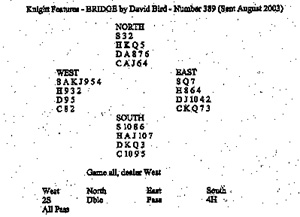|
Bridge
David Bird
— Knight Features
 West
opens with a weak 2S, showing 5-9 points. South responds 4H to the
take-out double and West plays the ace, king and jack of spades. How
would you play? Declarer ruffed the third spade with a high trump, to
avoid an overruff, and drew trumps in three rounds. It would be easy
to make the contract if West held one of the missing club honours. You
could simply take two finesses in the suit. West has already shown up
with 8 points, however, so a club honour would carry him over the
limit for a weak-two. Declarer tested the diamonds, since a 3-3 break
would allow him to throw a club on the fourth round. When they proved
to be 2-4, he ruffed the fourth round. The North, East and South hands
were all reduced to three cards in clubs. When declarer ran the ten of
clubs, East he had to win with one honour and lead away from the other
into dummy’s tenace. Game made! What would happen if West switched
to a club after cashing just one top spade? Declarer would play low in
the dummy, allowing East to win. East could not continue clubs from
his side, and would doubtless have crossed to his partner’s hand
with a second round of spades. Declarer wins the next club with the
ace, crosses to a diamond, ruffs a spade and plays four rounds of
trumps. East is squeezed in the minors, forced to throw a diamond or a
club honour. Only a club lead beats the contract. West
opens with a weak 2S, showing 5-9 points. South responds 4H to the
take-out double and West plays the ace, king and jack of spades. How
would you play? Declarer ruffed the third spade with a high trump, to
avoid an overruff, and drew trumps in three rounds. It would be easy
to make the contract if West held one of the missing club honours. You
could simply take two finesses in the suit. West has already shown up
with 8 points, however, so a club honour would carry him over the
limit for a weak-two. Declarer tested the diamonds, since a 3-3 break
would allow him to throw a club on the fourth round. When they proved
to be 2-4, he ruffed the fourth round. The North, East and South hands
were all reduced to three cards in clubs. When declarer ran the ten of
clubs, East he had to win with one honour and lead away from the other
into dummy’s tenace. Game made! What would happen if West switched
to a club after cashing just one top spade? Declarer would play low in
the dummy, allowing East to win. East could not continue clubs from
his side, and would doubtless have crossed to his partner’s hand
with a second round of spades. Declarer wins the next club with the
ace, crosses to a diamond, ruffs a spade and plays four rounds of
trumps. East is squeezed in the minors, forced to throw a diamond or a
club honour. Only a club lead beats the contract.
What will you rebid?
 Answer Answer
With a slightly stronger hand, you would rebid 2C, intending to
bid 2S, over a preference to 2D. When you are minimum it works better
to support spades immediately, despite the fact that you have only
three-card support. If you do not believe this, why not give it a try
for a few weeks? It is what all the ‘professionals’ do, despite
the fact that it means their partners will play more of the
hands!
Awards: 2S - 10, 2C - 7, 2D - 3.
|